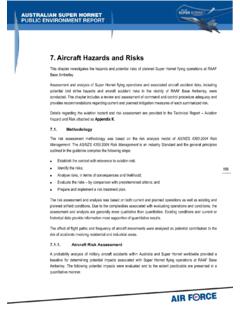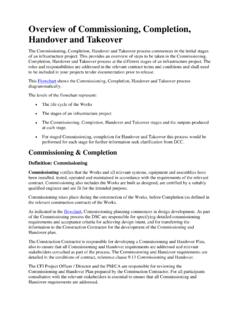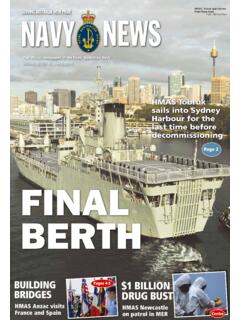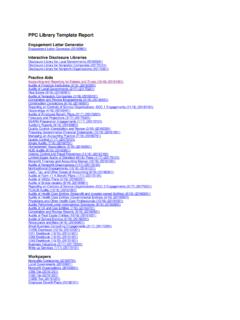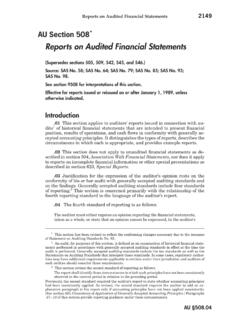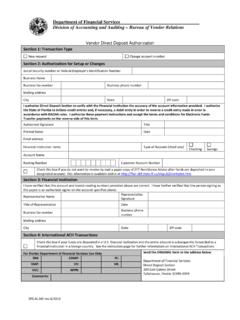Transcription of REPORT OF AN AUDIT OF THE AUSTRALIAN DEFENCE FORCE ...
1 REPORT OF AN AUDIT OF. THE AUSTRALIAN DEFENCE . FORCE INVESTIGATIVE. CAPABILITY. July 2006. Commonwealth of Australia 2005. ISBN 0642296499. This work is copyright. Apart from any use as permitted under the Copyright Act 1968, no part may be reproduced by any process without prior written permission from the Commonwealth. Requests and inquiries concerning reproduction and rights should be addressed to the Commonwealth Copyright Administration, Information and Security Division, Attorney General's Department, Robert Garran Offices, National Circuit, Barton ACT 2600 or posted at i TABLE OF CONTENTS. Submission Letter .. i Contents .. ii Executive Summary and Recommendations vi CHAPTER 1 THE NATURE OF ADF INVESTIGATIONS.
2 Inquiry and Investigation 1. Types of Investigation 1. Who conducts ADF Investigations? .. 2. Definition and Characteristics of a SP Investigation 3. Choice of Investigation Method .. 4. Lack of Standardisation .. 4. Summary . 5. Recommendations .. 5. CHAPTER 2 THE ENVIRONMENT IN WHICH ADF INVESTIGATIONS ARE. CONDUCTED. Deficiencies in SP Investigations . 6. Lack of Role Clarity . 6. Different Roles and Powers of Civilian and Military Police .. 8. Command Perceptions . 8. Untimeliness of Investigations . 11. Misemployment of Investigators . 12. Lack of Administrative Support .. 12. Delays in the ODMP .. 13. ODMP is understaffed .. 13. Content of Briefs of Evidence 13. Uncoordinated Posting Action.
3 13. Discipline Officers 14. The Preferred Environment .. 14. Absence of Policing Planning .. 15. Summary .. 15. Recommendations . 15. Attachment: 1. Function and Roles of the Service Police Organisations 17. CHAPTER 3 THE CURRENT SERVICE POLICE INVESTIGATIVE CAPABILITY. Introduction 18. The Current SP Capability .. 18. Nomenclature . 18. Navy .. 18. Army .. 19. Air FORCE 19. Provost Marshal . 19. ii Comparisons with Civilian Police 19. Desirable General Policing Tasks and Skills . 20. General Duties SP and Investigators .. 21. What is an ADF Investigator? .. 21. Workforce .. 22. Navy .. 22. Army .. 23. Air FORCE 24. Command Arrangements and Organisation . 24. Absence of Policing and Investigation Planning.
4 25. Workload . 25. Trends in the Number of SP Investigations .. 26. Trends in the Time taken to Investigate 26. Investigation Caseload .. 26. Ratios of SP to the ADF Population .. 27. Workload and Workforce Summary . 27. Attraction and Recruiting .. 27. Morale and Retention .. 28. Summary .. 29. CHAPTER 4 LEGISLATION, POLICY AND DOCTRINE. Introduction . 30. Sources of Policy Guidance .. 30. DFDA . 31. Adequacy of Investigative Powers 32. ADFP Administrative Inquiries Manual .. 33. Quick Assessment 33. Purpose of a QA . 33. Context management .. 43. Misplacement' of QA Policy .. 34. DEFENCE Instructions (DI) 34. Notifiable Incidents .. 35. The DEFENCE Investigation Technical Instructions 36.
5 Reporting .. 37. Summary .. 37. Recommendations 37. Attachment: 1. Proposed new ADF Quick Assessment Policy 40. CHAPTER 5 TRAINING. SP Schools 42. DPTC .. 42. Facilities .. 42. Command and Control 42. Instructor Staff 42. RAAF SFS 43. Facilities .. 43. Command and Control 43. Instructor Staff 43. iii The DPTC Curriculum 44. Training Issues 45. Refresher Training and Development for Investigators 47. Refresher Training .. 47. Development .. 47. Crime Scene Management 47. Relationships between ADF Investigators and Other Organisations . 48. Recommendations . 49. CHAPTER 6 RESOURCES. Human Resources . 51. Administrative Support .. 51. Funding 51. IT Support and the DPSMS .. 52. Summary.
6 53. Recommendations 53. CHAPTER 7 NEW SERVICE POLICE COMMAND, ORGANISATION AND. CONDITIONS OF SERVICE ARRANGEMENTS. Introduction .. 55. The ADF Investigative Capability Requirement 55. The ADF Environment 57. Lack of SP Role Clarity .. 58. Garrison Policing . 58. Lack of Confidence in SP Capabilities .. 59. Inadequate Doctrine and Policy 59. Investigator Practices and Procedures .. 59. An Anachronistic Service Police and Investigator Culture . 60. Essential partnerships .. 60. Structure of ADFIS .. 61. One Investigative Capability . 62. ADFIS Command and Control .. 63. Residual Roles of the Service Provosts Marshal (PM) .. 65. ADFIS Investigator Entry Criteria .. 65. Attracting Investigators 66.
7 Minimum Standards . 67. Investigator Training and Development .. 68. Investigator Numbers and Locations 69. In Australia .. 69. Overseas . 69. Conditions of Service 69. Rank and the Wearing of Plain Clothes 69. ADFIS Capability . 71. Police Intelligence . 71. Strategic Intelligence 71. Tactical Intelligence . 71. Legal Capability 71. Technical Support of ADFIS Operations . 71. An ADFIS Forensic Capability . 72. Summary .. 73. iv Recommendations .. 73. Attachments: 1. Proposed CDF Directive to Establish the ADFIS .. 78. 2. Proposed PMADF Duty Statement . 90. 3. Proposed Terms of Reference for the AUSTRALIAN DEFENCE Investigation Policy and Coordination Committee (ADIPCC) .. 92. CHAPTER 8 AN ACTION PLAN.
8 Investigative Capability Reform Goal .. 93. Timing and Phasing .. 93. Implementation 93. Phase 1 93. Phase 2 95. Phase 3 96. Recommendation . 96. Annexes: A. Terms of Reference .. 97. B. List of Those Interviewed . 101. C. Terminology and Abbreviations .. 109. v EXECUTIVE SUMMARY AND RECOMMENDATIONS. Introduction 1. The purpose of this AUDIT was to identify those reform measures required to provide the AUSTRALIAN DEFENCE FORCE (ADF) with an effective and efficient investigative capability. The task involved more than a straightforward evaluation of resource, personnel, support, and technical issues. It was made more complex by the size and scope of the problems identified, the scale and interrelated nature of the reforms necessary, and the considerable challenges and obstacles confronting independent, impartial and unfettered investigations conducted by Service Police (SP) investigators in the ADF.
9 Command environment. 2. Quite early, AUDIT team members perceived that the recommendations of the reports of a number of earlier reviews, including that undertaken of the Army's investigative capability by Ernst and Young in 2004 1, all of which identified deficiencies in the ADF investigative capability, did not seem to have produced decisive, measurable reforms or improvements. 3. In the event, this AUDIT has found that the ADF investigative capability is in serious decline and that remediation, even if approached with unremitting resolve and commitment, is likely to take no less than five years. The AUDIT has also found that the capacity of the SP in each Service to undertake a general, garrison' policing role, has virtually ceased to exist and that this has implications for the prevention and detection of Service-related offences and ultimately for the effectiveness and success of SP.
10 Investigators. 4. The viability of the investigative elements of the three Services is seriously threatened on several fronts. All are experiencing problems related to staff numbers allocated and their quality and experience. Many investigators have high workloads, poor administrative support and outdated and inadequate information technology support systems. The more fundamental deficiencies are that despite being reviewed, re- organised, restructured and downsized over the last fifteen years, SP still lack clear purpose and direction, a senior champion' or advocate to advance their interests, adequate leadership, and modern policy, doctrine, training and tradecraft. In consequence, investigator motivation and morale is suffering and capable people are contemplating leaving the ADF.

